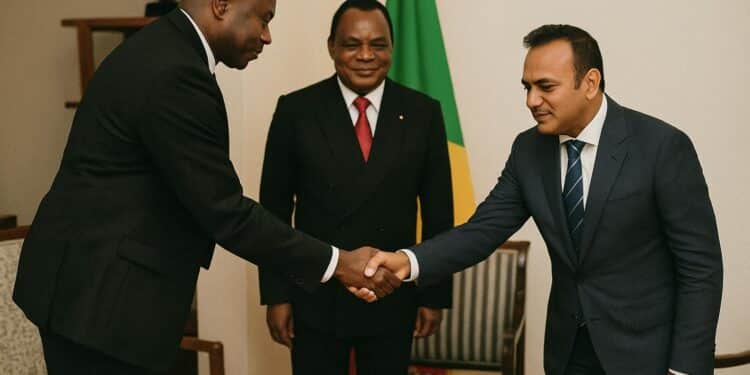A calibrated continental outreach
The soft-power offensive orchestrated by Brazzaville began on 21 July in Luanda and concluded its first leg on 25 July in Port-Louis, the Mauritian capital better known for turquoise lagoons than diplomatic crescendo. During this concise yet intensive itinerary, Foreign Minister Jean-Claude Gakosso met heads of state and senior ministers in Angola, Namibia, Botswana, Zimbabwe and Mauritius, each time delivering a sealed letter from President Denis Sassou Nguesso that pressed for a united African endorsement of Firmin Édouard Matoko’s candidacy to head UNESCO.
Mauritius proved emblematic of the campaign’s tone. President Dhananjay Ramful, according to participants, responded with what one envoy described as “studied enthusiasm,” signalling Port-Louis’s interest in aligning with a candidacy that promises greater visibility for Small Island Developing States within UNESCO’s agenda (Mauritian diplomatic note, 25 July 2023). Gakosso’s delegation stressed themes of linguistic diversity, climate resilience and South-South cooperation—concepts calibrated to resonate across the Indian Ocean.
The candidate’s profile and vision
Matoko’s résumé is anything but improvised. A former Assistant Director-General for Priority Africa and External Relations at UNESCO, he for years stewarded programmes ranging from heritage preservation along the Swahili Corridor to STEM education partnerships in the Sahel. Colleagues recall an administrator capable of reconciling the bureaucratic rigor of Paris headquarters with the political sensitivities of field offices, a skill set likely to appeal to Executive Board members seeking managerial continuity (UNESCO Secretariat briefing, February 2024).
In recent closed-door consultations, the Congolese contender has foregrounded three pillars: revitalising multilateral trust after the pandemic, amplifying digital literacy without eroding cultural identities, and ensuring equitable financing for Africa-centred projects. That triad, sources suggest, was refined after iterative dialogues with think tanks in Addis Ababa and Dakar, reflecting an aspiration to transform Africa from beneficiary to agenda-setter within UNESCO.
Regional dynamics and global stakes
The last African to lead UNESCO, Irina Bokova’s predecessor Federico Mayor Zaragoza, left office in 1999; since then, voting blocs have oscillated between geographic equity and realpolitik. With the African Union having repeatedly advocated rotational leadership across UN agencies (AU Communiqué, February 2023), Congolese diplomats interpret the current moment as propitious for an African consensus. Pretoria and Cairo, both historically influential within UNESCO, are said to be leaning toward the Matoko bid after assurances that their flagship projects—robotics curricula and underwater-heritage mapping—would secure priority backing.
Yet the election transcends continental arithmetic. The intramural politics of UNESCO often hinge on cultural-property debates and media-freedom resolutions. In that theatre, Brazzaville’s narrative frames Matoko as a bridge-builder who can defuse polarising dossiers, from the restitution of artefacts to the ethics of artificial intelligence. Observers in Paris note that such positioning, if sustained, could resonate with European members keen to stabilise the agency’s budgetary environment after recent withdrawals and rejoins.
Beyond Africa: anticipated corridors of support
While the continental tour captured early headlines, strategists are already mapping a second concentric circle of lobbying. Prime Minister Anatole Collinet Makosso is slated to engage counterparts in Gabon, Côte d’Ivoire, Nigeria, Burkina Faso, Liberia and Djibouti from 27 July onward, before extending the quest to Latin America and the Caribbean—regions that historically weigh the same 58 Executive Board votes as Europe or Asia.
Preliminary contacts with the Community of Latin American and Caribbean States suggest receptivity, particularly to Matoko’s pledge to fortify UNESCO’s Havana-based Regional Office. In Asia, Jakarta has signalled conditional support tied to increased funding for tsunami-warning systems. Such quid pro quo is conventional currency in multilateral elections, yet Congolese officials emphasise that any commitments will be tethered to UNESCO’s existing strategic framework to avoid the perception of transactional diplomacy.
Strategic implications for Congo-Brazzaville
Should Matoko secure the Director-General’s gavel, Congo-Brazzaville would gain intangible dividends that extend beyond individual prestige. A national closely associated with the Makoua School of Thought, which advocates balancing ecological stewardship with economic modernisation, would occupy a vantage point from which to articulate Central Africa’s developmental narratives on a global platform. This, Congolese analysts argue, could translate into stronger alignment between UNESCO programmes and sub-regional priorities such as forest-based carbon markets and inclusive bilingual education.
Even if the bid falls short, the campaign itself consolidates Brazzaville’s diplomatic networks, showcasing an administration capable of nimble, issue-focused engagement. That reputational capital may prove valuable as Congo prepares to host the 2025 Summit on the Three Basins of Biodiversity—an event where cultural heritage, scientific collaboration and climate governance will intersect. In the measured words of a senior African Union official, “Congo is not merely proposing a candidate; it is signalling a readiness to shoulder multilateral responsibilities commensurate with its ambitions.”












































